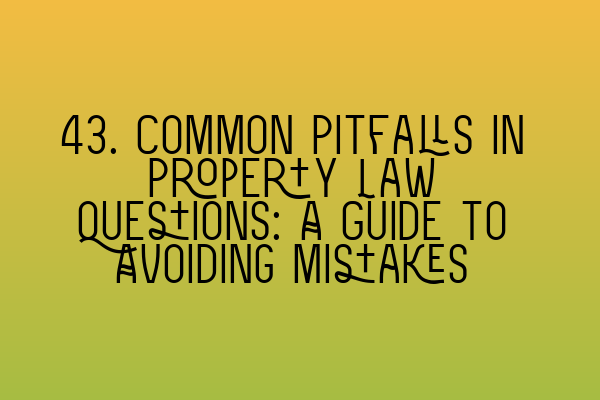43. Common Pitfalls in Property Law Questions: A Guide to Avoiding Mistakes
When it comes to property law, there are numerous complexities and potential pitfalls that can catch even the most seasoned legal professionals off guard. Whether you are a trainee solicitor preparing for the SQE exams or a seasoned practitioner, it is crucial to be aware of these common pitfalls to avoid making costly mistakes.
In this comprehensive guide, we will explore 43 common pitfalls in property law questions and provide you with a roadmap to navigate them successfully. By understanding these pitfalls, you can enhance your legal knowledge, improve your exam performance, and handle property law matters more effectively.
Before delving into the common pitfalls, it is essential to familiarize yourself with the fundamental principles of property law. If you need a quick refresher or want more practice, check out our SQE 1 Practice Exam Questions and our SQE 1 Practice Mocks FLK1 FLK2 articles. These resources will provide you with valuable insights and help you test your knowledge.
Let’s now get into the heart of the matter and explore the common pitfalls you should be wary of in property law questions:
1. Failure to identify the type of property: One common mistake is not clearly identifying the type of property involved in the question. Whether it’s freehold, leasehold, or a mixed-use property, understanding the nuances of each type is crucial for accurate analysis.
2. Misinterpreting landlord and tenant relationships: It is vital to comprehend the rights and obligations of both landlords and tenants. Failure to do so can lead to erroneous conclusions and advice.
3. Overlooking registration requirements: Registering property rights is essential for legal certainty. Neglecting registration requirements can lead to invalid transactions and potential disputes in the future.
4. Neglecting restrictive covenants: Restrictive covenants are often overlooked but can have significant implications on property use and development. Ensure you identify and consider any relevant covenants.
5. Ignoring planning and zoning regulations: Property law is closely intertwined with planning and zoning regulations. Ignoring these regulations can result in non-compliance and potentially illegal actions.
6. Disregarding environmental considerations: In today’s environmentally conscious world, it is crucial to consider environmental regulations and potential liabilities associated with contaminated land or hazardous materials.
7. Neglecting easements and rights of way: Easements and rights of way are commonly misunderstood, leading to errors in advising clients on property rights and access.
8. Inadequate consideration of mortgage law: Mortgages play a significant role in property transactions. Failing to understand mortgage law can impact your ability to provide comprehensive advice to clients.
9. Misapplying the doctrine of fixtures: The doctrine of fixtures determines whether an object is considered part of the property or personal belongings. Misapplying this doctrine can lead to incorrect conclusions regarding ownership.
10. Misinterpreting co-ownership rights: Co-ownership of property can be complex. Misinterpreting the rights and obligations of co-owners can have serious implications for your clients.
These are just a few examples of the common pitfalls to watch out for in property law questions. Each situation is unique, and it’s crucial to carefully analyze the facts and apply the relevant legal principles to avoid making mistakes.
To further enhance your knowledge and prepare for SQE exams, consider enrolling in our SQE 2 Preparation Courses and SQE 1 Preparation Courses. These comprehensive courses are designed to equip you with the skills and knowledge required to excel in the exams.
Remember, the key to success in property law is a deep understanding of the legal principles, attention to detail, and constant practice. By studying the common pitfalls and applying the relevant legal principles, you can confidently navigate property law questions and provide accurate advice to your clients.
Stay tuned for future articles where we will explore more property law topics and provide valuable insights to help you succeed in your legal career.
For the latest information on SRA SQE Exam Dates, visit our website and stay up to date with the upcoming exams.
In conclusion, property law questions can be challenging, but by avoiding these common pitfalls, you can approach them with confidence. Stay vigilant, keep practicing, and remember that knowledge is power in the world of property law.
